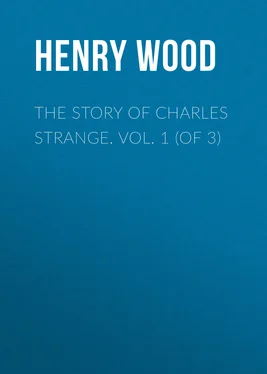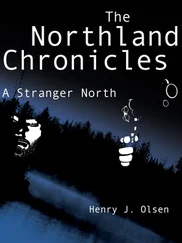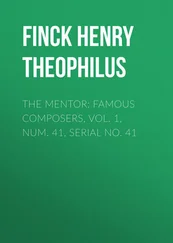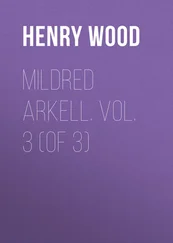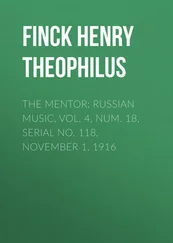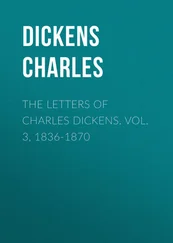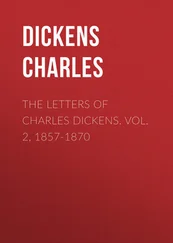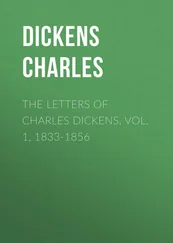Henry Wood - The Story of Charles Strange. Vol. 1 (of 3)
Здесь есть возможность читать онлайн «Henry Wood - The Story of Charles Strange. Vol. 1 (of 3)» — ознакомительный отрывок электронной книги совершенно бесплатно, а после прочтения отрывка купить полную версию. В некоторых случаях можно слушать аудио, скачать через торрент в формате fb2 и присутствует краткое содержание. Жанр: foreign_sf, literature_19, foreign_antique, foreign_prose, на английском языке. Описание произведения, (предисловие) а так же отзывы посетителей доступны на портале библиотеки ЛибКат.
- Название:The Story of Charles Strange. Vol. 1 (of 3)
- Автор:
- Жанр:
- Год:неизвестен
- ISBN:нет данных
- Рейтинг книги:4 / 5. Голосов: 1
-
Избранное:Добавить в избранное
- Отзывы:
-
Ваша оценка:
- 80
- 1
- 2
- 3
- 4
- 5
The Story of Charles Strange. Vol. 1 (of 3): краткое содержание, описание и аннотация
Предлагаем к чтению аннотацию, описание, краткое содержание или предисловие (зависит от того, что написал сам автор книги «The Story of Charles Strange. Vol. 1 (of 3)»). Если вы не нашли необходимую информацию о книге — напишите в комментариях, мы постараемся отыскать её.
The Story of Charles Strange. Vol. 1 (of 3) — читать онлайн ознакомительный отрывок
Ниже представлен текст книги, разбитый по страницам. Система сохранения места последней прочитанной страницы, позволяет с удобством читать онлайн бесплатно книгу «The Story of Charles Strange. Vol. 1 (of 3)», без необходимости каждый раз заново искать на чём Вы остановились. Поставьте закладку, и сможете в любой момент перейти на страницу, на которой закончили чтение.
Интервал:
Закладка:
"Fifteen or twenty years, Uncle Stillingfar!"
"Not less. I was steady, persevering, sufficiently clever. Yet practice did not come to me. It is all a lottery. I had no fortune, lad; no one to help me. I was not clever at writing for the newspapers and magazines, as many of my fellows were. And for more years than I care to recall I had a hard struggle for existence. I was engaged to be married. She was a sweet, patient girl, and we waited until we were both bordering upon middle age. Ay, Charles, I was forty years old before practice began to flow in upon me. The long lane had taken a turning at last. It flew in then with a vengeance—more work than I could possibly undertake."
"And did you marry the young lady, Uncle Charles?" I asked in the pause he came to. I had never heard of his having a wife.
"No, child; she was dead. I think she died of waiting."
I drew a long breath, deeply interested.
"There are scores of young fellows starving upon hope now, as I starved then, Charles. The market is terribly overstocked. For ten barristers striving to rush into note in my days, you may count twenty or thirty in these. I will not have you swell the lists. My brother's grandson shall never, with my consent, waste his best years in fighting with poverty, waiting for luck that may never come to him."
"I suppose it is a lottery, as you say, sir."
"A lottery where blanks far outweigh the prizes," he assented. "A lottery into which you shall not enter. No, Charles; you shall be spared that. As a lawyer, I can make your progress tolerably sure. You may be a rich man in time if you will, and an honourable one. I have sounded my old friend, Henry Brightman, and I think he is willing to take you."
"I am afraid I should not make a good pleader, sir," I acknowledged, falling in with his views. "I can't speak a bit. We had a debating-club at school, and in the middle of a speech I always lost myself."
He nodded, and rose. "You shall not try it, my boy. And that's all for to-day, Charles. All I wanted was to sound your views before making arrangements with Brightman."
"Has he a good practice, sir?"
"He has a very large and honourable practice, Charles. He is a good man and a gentleman ," concluded the Serjeant emphatically. "All being well, you may become his partner sometime."
"Am I not to go to Oxford, sir?" I asked wistfully.
"If you particularly wish to do so and circumstances permit it, you may perhaps keep a few terms when you are out of your articles," he replied, with hesitation. "We shall see, Charles, when that time comes."
"What a shame!" exclaimed Mrs. Carlen, when I reached home. "Make you a lawyer! That he never shall, Charles. I shall not allow it. I will go down and remonstrate with him."
Major Carlen said it was a shame; said it contemptuously. Tom said it was a double-shame, and threw a host of hard words upon Mr. Serjeant Stillingfar. Blanche began to cry. She had been reading that day about a press-gang, and quite believed my fate would be worse than that of being pressed.
After breakfast, next morning, we hastened to Lincoln's Inn: I and Mrs. Carlen, for she kept her word. I should be a barrister or nothing, she protested. All very fine to say so! She had no power over me whatever. That lay with Mr. Serjeant Stillingfar and the other trustee, and he never interfered. If they chose to article me to a chimneysweep instead of a lawyer, no one could say them nay.
Mr. Jones and young Lake sat side by side at the desk in the first room when we arrived. Mr. Serjeant Stillingfar was in his own room. He received us very kindly, shaking hands with Mrs. Carlen, whom he had seen occasionally. Mrs. Carlen, sitting opposite to him, entered upon her protest, and was meekly listened to by the Serjeant.
"Better be a successful attorney, madam, than a briefless barrister," he observed, when she finished.
"All barristers are not briefless," said Mrs. Carlen.
"A great many of them are," he answered. "Some of them never make their mark at all; they live and die struggling men." And, leaning forward in his chair—as he had leaned towards me yesterday—he repeated a good deal that he had then said of his own history; his long-continued poverty, and his despairing struggles. Mrs. Carlen's heart melted.
"Yes, I know. It is very sad, dear Mr. Serjeant, and I am sure your experience is only that of many others," she sighed. "But, if I understand the matter rightly, the chief trouble of these young barristers is their poverty. Had they means to live, they could wait patiently and comfortably until success came to them."
"Of course," he assented. "It is the want of private means that makes the uphill path so hard."
"Charles has his three hundred a year."
The faint pink in his cheeks, just the hue of a sea-shell, turned to crimson. I was sitting beyond the table, and saw it. He glanced across at me.
"It will take more money to make Charles a lawyer and to ensure him a footing afterwards in a good house than it would to get him called to the Bar," he said with a smile.
"Yes—perhaps so. But that is not quite the argument, Mr. Serjeant," said my stepmother. "Any young man who has three hundred a year may manage to live upon it."
"It is to be hoped so. I know I should have thought three hundred a year a perfect gold-mine."
"Then you see Charles need not starve while waiting for briefs to come in to him. Do you not see that, Mr. Serjeant?"
"I see it very clearly," he mildly said. "Had Charles his three hundred a year to fall back upon, he might have gone to the Bar had he liked, and risked the future."
"But he has it," Mrs. Carlen rejoined, surprise in her tone.
"No, madam, he has it not. Nor two hundred a year, nor one hundred."
They silently looked at one another for a full minute. Mrs. Carlen evidently could not understand his meaning. I am sure I did not.
"Charles's money, I am sorry to say, is lost," he continued.
"Lost! Since when?"
"Since the bank-panic that we had nearly two years ago."
Mrs. Carlen collapsed. "Oh, dear!" she breathed. "Did you—pray forgive the question, Mr. Serjeant—did you lose it? Or—or—the other trustee?"
He shook his head. "No, no. We neither lost it, nor are we responsible for the loss. Charles's grandfather, my brother, invested the money, six thousand pounds, in bank debentures to bring in five per cent. He settled the money upon his daughter, Lucy, and upon her children after her, making myself and our old friend, George Wickham, trustees. In the panic of two years ago this bank went ; its shares and its debentures became all but worthless."
"Is the money all gone? quite gone?" gasped Mrs. Carlen. "Will it never be recovered?"
"The debentures are Charles's still, but they are for the present almost worthless," he replied. "The bank went on again, and if it can recover itself and regain prosperity, Charles in the end may not greatly suffer. He may regain his money, or part of it. But it will not be yet awhile. The unused portion of the income had been sunk, year by year, in further debentures, in accordance with the directions of the will. All went."
"But—someone must have paid for Charles all this time—two whole years!" she reiterated, in vexed surprise.
"Yes! it has been managed," he gently said.
"I think you must have paid for him yourself," spoke Mrs. Carlen with impulse. "I think it is you who are intending to pay the premium to Mr. Brightman, and to provide for his future expenses? You are a good man, Mr. Serjeant Stillingfar!"
Конец ознакомительного фрагмента.
Текст предоставлен ООО «ЛитРес».
Прочитайте эту книгу целиком, купив полную легальную версию на ЛитРес.
Читать дальшеИнтервал:
Закладка:
Похожие книги на «The Story of Charles Strange. Vol. 1 (of 3)»
Представляем Вашему вниманию похожие книги на «The Story of Charles Strange. Vol. 1 (of 3)» списком для выбора. Мы отобрали схожую по названию и смыслу литературу в надежде предоставить читателям больше вариантов отыскать новые, интересные, ещё непрочитанные произведения.
Обсуждение, отзывы о книге «The Story of Charles Strange. Vol. 1 (of 3)» и просто собственные мнения читателей. Оставьте ваши комментарии, напишите, что Вы думаете о произведении, его смысле или главных героях. Укажите что конкретно понравилось, а что нет, и почему Вы так считаете.
